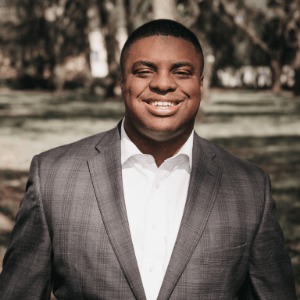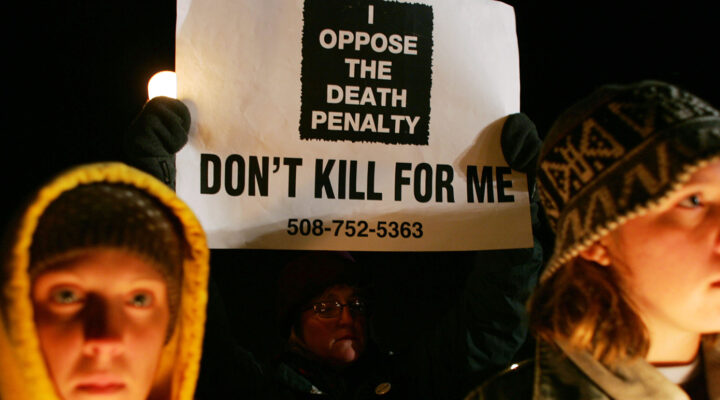A former member of the Oklahoma Pardon and Parole Board has helped launch a new anti-death penalty group to educate fellow conservatives and lobby state lawmakers about the flaws of capital punishment.

Adam Luck
The new branch of Conservatives Concerned About the Death Penalty was unveiled in a livestreamed press conference Aug. 25, the same day Oklahoma executed the first of a slate of 25 prisoners scheduled to die by lethal injection over the next two years — about one a month.
Adam Luck resigned from the parole board in January at the request of Gov. Kevin Stitt, with whom he disagreed about the validity of the death penalty. Luck said he was swayed by three years on the panel and by a 2017 bipartisan commission report that found Oklahoma’s death penalty system to be deeply flawed.
“The stakes are too high for us not to apply the highest levels of intellectual integrity and moral aspirations when deciding whether or not to use the death penalty.”
“I challenge every legislator, local, state and federal elected official to honestly examine your beliefs, read the commission report and have the courage to decide again on your beliefs in the death penalty,” Luck said during the new conference. “At the end of that process, we may still disagree. But the stakes are too high for us not to apply the highest levels of intellectual integrity and moral aspirations when deciding whether or not to use the death penalty, and whether or not we want the state of Oklahoma to continue killing in our name.”
A project of Equal Justice USA, Conservatives Concerned About the Death Penalty is a national network of political and social conservatives who believe capital punishment violates the core principles of conservatism, national manager Demetrius Minor said.
“When it comes to our philosophy that government should be small and limited, the death penalty falls very short. We are concerned that government is too big, and we are concerned about the possibility that an innocent person could be put to death,” he said.
Capital punishment achieves none of its stated goals, such as lowering the rate of violent crimes, bringing closure to the families of victims or serving justice, Minor added.
“As someone who is proudly a pro-life conservative, I find it difficult and inconsistent to be pro-life and simultaneously pro-death penalty.”
“Many of us are disturbed about how the death penalty is an emotional rollercoaster for the family members of murder victims and why we are investing so much in a system that doesn’t keep us safe or deter crimes. Many of us believe the death penalty contradicts our values of protecting a consistent life ethic. As someone who is proudly a pro-life conservative, I find it difficult and inconsistent to be pro-life and simultaneously pro-death penalty.”

Demetrius Minor
The launch of the group’s Oklahoma branch coincided with the state’s plan to execute about one inmate per month during the next two years, beginning with James Coddington Aug. 25. It also follows an October execution that ended a moratorium on capital punishment initiated by a botched lethal injection in 2014.
The new chapter “makes perfect sense for Oklahoma given its conservative culture and its recent history with the death penalty,” Minor said. “We are at a tipping point here in the state.”
One of the key recommendations of the Oklahoma Death Penalty Review Commission was that, at the very least, the now-ended moratorium be continued while the many flaws in the state’s capital punishment system be addressed. Those include varying unfair standards for guilt in death penalty cases and proven problems with chemicals used in lethal injections. Critics have noted that none of the commission’s recommendations have been adopted.
“Unfortunately, a review of the evidence demonstrates that the death penalty, even in Oklahoma, has not always been imposed and carried out fairly, consistently and humanely, as required by the federal and state constitutions,” the commission said in the report.
The report offered plenty of reasons why conservatives should doubt the appropriateness of the death penalty, said Brett Farley, executive director of the Catholic Conference of Oklahoma and state coordinator for Conservatives Concerned About the Death Penalty.
“Many of the concerns identified in the report touched on principles that conservatives hold dear, namely the exorbitant cost of the death penalty compared to life imprisonment without parole.”
“How many innocent people are we willing to put to death before we as a conservative state decide to hit the pause button?”
But the violations of pro-life values are especially alarming, he said. “Among the many troubling findings in the report was the inability of the state to guarantee against executing innocent people. … How many innocent people are we willing to put to death before we as a conservative state decide to hit the pause button?”
Conservatives Concerned already is having conversations with Republican lawmakers about possible legislation, Farley said.
“The time for conservatives to take seriously, and discuss publicly, the problem inherent in the Oklahoma system is long overdue, and that’s what we intend to do by bringing together conservative leaders.”
Related articles:
Faith leaders call for urgent opposition to Oklahoma plan to execute an inmate a month for two years
The death penalty is dying a slow death; it’s time we pull the plug | Analysis by Stephen Reeves
Panel of faith leaders will raise awareness of death penalty injustice
American support for death penalty remains low, as new debates arise in Oklahoma, Ohio and Texas


